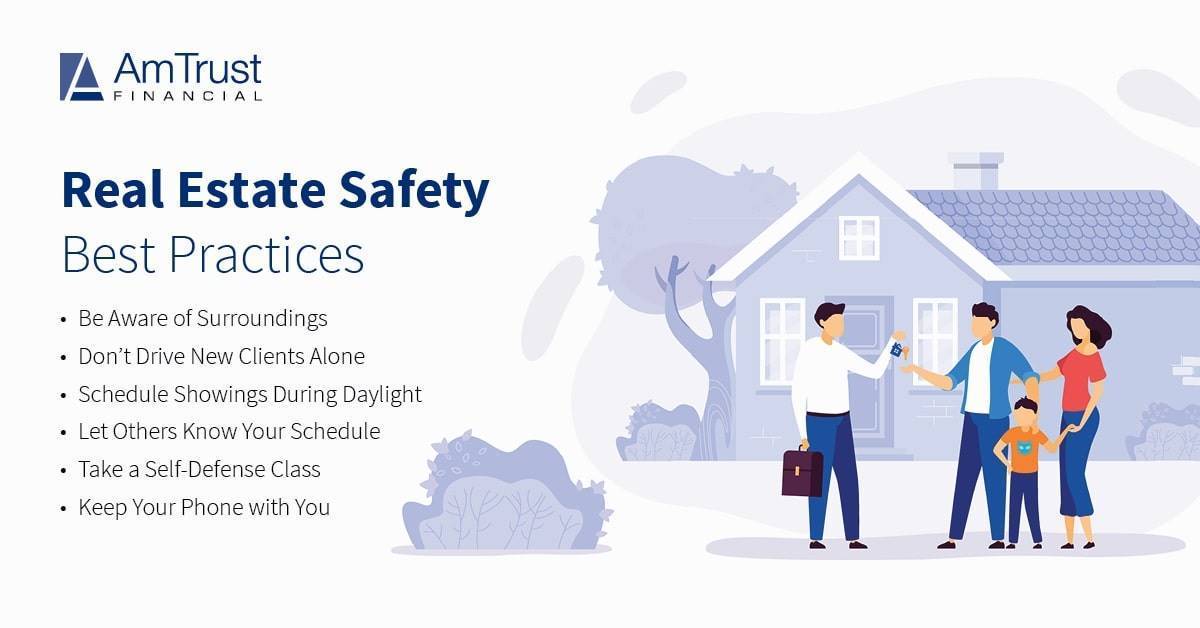Summary: Although real estate might not seem like a high-risk profession, real estate agents can face dangerous situations, from personal attacks to cybercrime. Having the right business insurance coverage and implementing a robust risk management plan is a necessity. We’ll explain how to stay safe as a real estate agent and more in this article. Real Estate Risks and Workplace Safety
Showing clients their potential dream home and sharing their excitement is one of the main perks of a real estate agent’s job. One might not imagine touring clients through homes for sale, hosting open houses and working up contracts as a risky profession. However,
recent news stories show a rise in attacks on and attempted abductions of real estate agents, real estate scams, dangerous clients and more – all showcasing the risks agents face as they go about their daily duties.

According to the
National Association of Realtors® (NAR) 2020 Member Safety Report, 23% of realtors experienced a situation that made them fear for their personal safety or the safety of their personal information. Thirty-one percent report feeling unsafe during an open house and 58% use a smartphone safety app to track whereabouts and alert colleagues in case of an emergency. In addition, real estate agents regularly risk their safety simply by meeting new clients, driving clients to tour homes and showing vacant properties.
Physical safety is not the only concern for real estate agents. Improperly disclosing information like property defects to potential buyers can put agents at risk for a lawsuit. Additionally, real estate agents have access to and often store clients’ financial records, which could be exposed in a data breach.
How to Stay Safe as a Real Estate Agent
NAR offers various safety tips and best practices to ensure real estate agents understand how to protect themselves on the job. Some of the best real estate safety tips include:
Create a Risk Management Plan for Real Estate Agents
Real estate agencies should take a proactive approach in managing the risks facing their agents by creating standard safety procedures everyone in the organization can follow. Risk management obviously includes having the right
real estate insurance policies in place, such as a
businessowners policy,
general liability coverage,
commercial property insurance and
cyber liability insurance. However, implementing a safety plan or strategy by developing proper protocols to protect real estate agents and staff in the event of an emergency is also key.

The overall real estate safety plan should include best practices such as:
- Always stay alert and aware of your surroundings.
- Never drive alone with a new client. Instead, meet at the agency or the home showing the first time.
- Show properties during daylight hours.
- Make sure other team members know your schedule and whereabouts at all times.
- Take a self-defense class.
- Do not host open houses alone.
- Keep your cell phone charged and make sure you have a signal before an appointment.
NAR offers a robust
list of safety tips that should be a part of all real estate risk management plans.
Perform Real Estate Agent Safety Training
Professional safety training courses for real estate agents can mean the difference between life and death. Schedule monthly or, at the very least, quarterly safety training that includes topics like common crimes against real estate agents, how to prevent those crimes, how to respond to a physical attack, open house safety tips, safety and technology and more.
Be Cyber Smart
Every industry is at
risk for a cyber attack, and the real estate industry is no exception. Part of a real estate agent’s job is to collect personal information from buyers and sellers and store their data online.
Watch out for emails from unknown senders, especially those that request clients’ personal information such as account numbers, credit card numbers or passwords. Also, never click on any suspicious links in an email, even if you recognize the sender, as they could lead to your computer becoming infected with malware or other viruses.
Be careful with how you’re sharing information online or on social media, especially regarding client and
password information. It’s considered a best practice to have a business social media account separate from your personal page, which should be made private to limit the amount of information shared.
Protect Your Real Estate Agency with Small Business Insurance Coverage from AmTrust
AmTrust Financial understands the risks and challenges facing real estate agents and can help protect your business with a wide array of customizable coverages. For more information about our
small business insurance solutions, please
contact us today.
This material is for informational purposes only and is not legal or business advice. Neither AmTrust Financial Services, Inc. nor any of its subsidiaries or affiliates represents or warrants that the information contained herein is appropriate or suitable for any specific business or legal purpose. Readers seeking resolution of specific questions should consult their business and/or legal advisors. Coverages may vary by location. Contact your local RSM for more information.